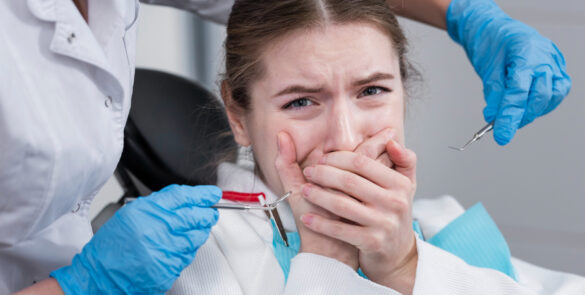How Dental Health Impacts Mental Well-being?
The link between dental health and mental well-being is undeniable, and it can be succinctly encapsulated using the acronym SPACES:
S: Sugar intake,
P: Phobia,
A: Apthous Ulcers,
C: Clenching
E: Loss of Enamel and
S: Self-esteem.
In this comprehensive blog, we will dive deeper into each element of “SPACES” to explore how our dental health affects our mental state. By understanding these connections, we can take better care of our oral health to maintain a positive state of mind and overall well-being.
S: Sugar Intake - A Sweet Tooth's Impact on Mental Health

Image by <a href=”https://www.freepik.com/free-photo/delicious-ice-cream-cookies-high-angle_33993683.htm#query=chocloate%20icrecreams%20cakes&position=20&from_view=search&track=ais”>Freepik</a>
We often underestimate the effect of our sugar intake on both our dental and mental health. In times of stress, it’s not uncommon to turn to sugary comfort foods. However, this excessive sugar consumption can lead to binge eating and in-between meals snacking. This, in turn, increases the intake of carbohydrates, which can accumulate between our teeth and combine with dental plaque, leading to cavity formation.
Craving sweets is natural, but the key is moderation and proper dental care. Enjoy your sugary treats at the end of a meal when saliva production is higher, which can help to neutralize acids. Afterward, make it a habit to clean your teeth, removing the stuck carbohydrates from between your teeth and preventing cavities.
P: Phobia - Conquering Dental Fears for Mental Well-being

Image by <a href=”https://www.freepik.com/free-photo/close-up-sad-woman-with-toothache_6426116.htm#query=https%20www%20freepik%20com%20free-photo%20dentist-injecting-anesthetics-scared-female-patient-mouth_8404243%20htm%20query=phobia%20amp%20position=14%20amp%20from_view=search%20amp%20track=sph&position=1&from_view=search&track=ais”>Freepik</a>

<a href=”https://www.freepik.com/free-photo/close-up-worried-guilty-cute-woman-grimacingnervously_10347359.htm#query=clenching%20of%20teeth&position=36&from_view=search&track=ais”>Image by cookie_studio</a> on Freepik
Dental phobia is a genuine concern for many individuals, and it often leads to the postponement of dental visits until problems become overwhelming. The fear of dentists, drills, injections, and the unfamiliar sounds of dental devices can be paralyzing.
It’s essential to address dental phobia as it can negatively impact your dental health and, consequently, your mental well-being. Understanding that modern dentistry is virtually painless and focuses on patient comfort is a crucial step in overcoming this fear. Dentists are equipped with advanced technology and techniques to ensure a pain-free experience.
As the American comic poet Ogden Nash once humorously stated, “Few tortures are physical, few tortures are mental; but one that is both is dental.” However, it’s crucial to note that dental treatment has come a long way since Nash’s time, and today’s dental care is far from torturous.
Stress related Apthous Ulcers

Image by <a href=”https://www.freepik.com/free-vector/flat-design-stomatitis illustration_37116065.htm#query=mouth%20ulcers&position=4&from_view=search&track=ais”>Freepik</a>
Apthous ulcers, often referred to as canker sores, are painful, round sores that form inside the mouth. They frequently occur during stressful times, such as exams or other life challenges. Stress can weaken the immune system, making it easier for these ulcers to develop.
Stress also leads to teeth clenching, a condition known as bruxism. This unconscious behavior during sleep or while awake can cause damage to your teeth and jaw. It’s crucial to recognize and address these stress-related oral health issues as they can have a significant impact on mental well-being.
C: Clenching - The Unconscious Bruxism Habit

<a href=”https://www.freepik.com/free-photo/young-woman-frowning-face_16910685.htm#page=2&query=teeth%20clenching&position=27&from_view=search&track=ais”>Image by 8photo</a> on Freepik
Teeth clenching, known as bruxism is an involuntary habit that often arises due to mental stress and anxiety, and it can have a profound impact on both dental health and mental well-being.
Bruxism typically occurs during sleep, and some individuals may clench their teeth while awake, especially when under stress. The excessive force exerted during teeth clenching can result in several adverse effects on your oral health such as tooth wear, tooth sensitivity and jaw pain and Temporomandibular Joint (TMJ) disorders.
E: Loss of Enamel - Mindful Dental Care for Mental Health
The loss of enamel, the protective outer layer of our teeth, can occur when we don’t brush our teeth mindfully. Applying excessive force while brushing, especially with abrasive toothpaste, can lead to abrasion cavities. These cavities typically develop at the gum line and result in tooth sensitivity, particularly to extremely cold substances like water or ice cream.
To maintain good dental health and avoid the mental stress associated with tooth sensitivity, it’s important to brush your teeth with a gentle, circular motion. Additionally, using a toothbrush with soft bristles can help protect your enamel and prevent further damage.
S: Low Self-esteem and the Impact of Dental Imperfections

<a href=”https://www.freepik.com/free-photo/girl-striped-shirt-looks-terrified-scared_13520400.htm#query=girl%20hiding%20smile%20due%20to%20self-consciuos&position=0&from_view=search&track=ais”>Image by Racool_studio</a> on Freepik
Low self-esteem can be closely tied to the appearance of our teeth. Misaligned front teeth or gaps between teeth can make individuals self-conscious about their smiles. This, in turn, affects their self-esteem and confidence, leading to negative feelings about their appearance.
Dental imperfections don’t just affect our self-esteem; they can also hinder our ability to express ourselves and connect with others. Addressing these concerns through orthodontic treatment or cosmetic dentistry can significantly improve self-esteem and overall mental well-being.
Conclusion: Creating a Positive SPACES for Mental and Dental Health
Understanding the SPACES connection – Sugar intake, Phobia, Apthous Ulcers, Clenching, Loss of Enamel, and low Self-esteem – is essential for maintaining both dental and mental health. By taking a holistic approach to our well-being, we can create a positive space where dental health contributes to our overall mental wellness.
It’s vital to overcome dental phobia, manage stress, and prioritize dental hygiene to break the cycle of dental issues negatively affecting mental health. Remember that dental treatment has come a long way and is designed to be comfortable and virtually painless.
By focusing on these aspects of dental health, you can not only maintain a bright smile but also contribute to a brighter state of mind and overall well-being. Embrace the SPACES connection, and invest in your dental health for a healthier, happier you.







